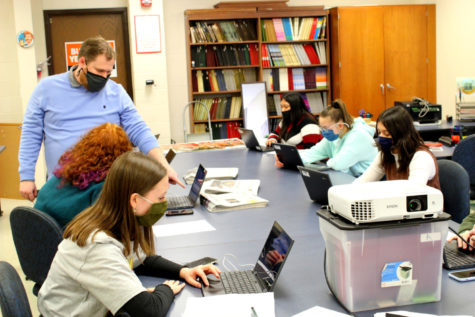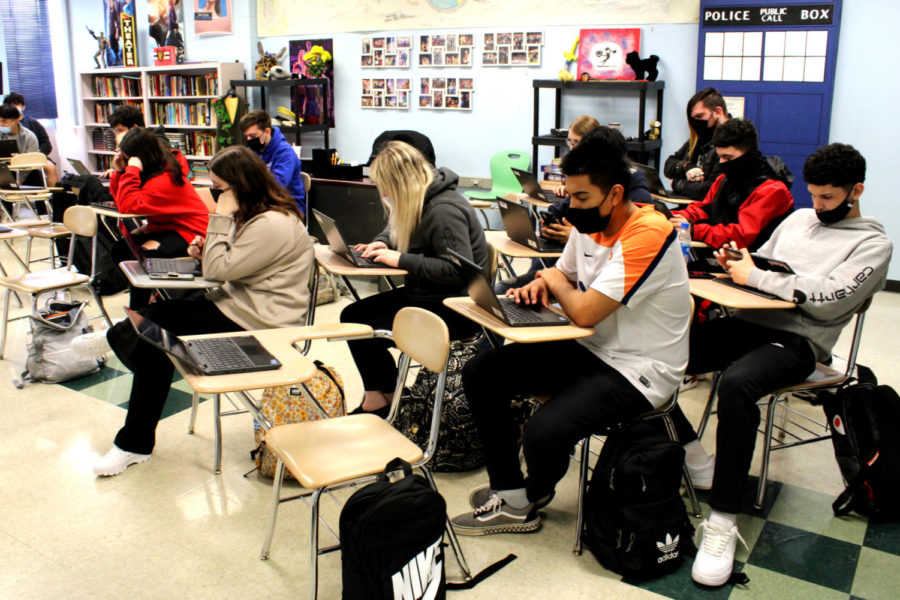Knowledge vs. Grades
Students work on their laptops during third period.
As sophomore Jasmine Zimmerman goes about her day from class to class, different questions run through her head: “Did I finish the homework?” or “How did I do on that test?” In class, just as the teacher begins to talk, Jasmine’s phone brightens up as she gets a notification on her phone: “Powerschool: class grade dropped.” Not only did her class grade drop, but as she read the notification, her heart dropped as well. The thing that has been worrying her all day seemed to come true. Even if it was just one class, she is upset. She is now worried about whether or not she could make this grade up or if she had to deal with it. Not only that, but she is also scared of the disappointment she will now have to face from not only her teacher but her parents as well. Better yet, with all this worrying, how was she expected to now focus in the middle of this lesson, with a pit in her stomach.
As a teenager, school can be a very stressful time and place. Many also do a huge amount of school activities or have jobs. As students go about their day, a common worry that many face is grades.
“I feel like grades affect me in a negative way, like all I am is the number that’s in the grade book. If I’m not passing, I am looked down upon, and it feels like everyone thinks differently of me,” sophomore Jasmine Zimmerman said.
Although grades can affect students negatively, there are also reasons that having grades is important for the class.
“Grades create both a positive and negative effect on the students. The positive side being that you are able to see if you fully understand the topic and know you’re doing well in that class. Without grades, many students would rather slack off and not do homework, as many did during the 2020 school year due to COVID. The positive being that many students can take more time to get interested in the topic and become more knowledgeable about it,” junior Payton Herr said.
As students go about assignments and tests, this can lead to the question: Are they actually learning, or is it all about the grade they are receiving?
“I think students go for the grade instead of caring about the information being presented by the teacher. If a student doesn’t have to worry about passing or failing, then they are going to be more interested in learning about the subject,” Herr said.
Other students agree with this as well.
“I think students care more about the grade they are getting rather than the knowledge they are attaining. I feel like as a student there are always people breathing down my neck that I need to pass and grades come before everything else, and sometimes I’m so worried about passing that I’m not bothered to actually learn what’s going on in the class. Just enough to pass the next test,” Zimmerman said.
Some teachers have begun to notice the challenges that some students have faced due to stressing about grades.
“I think that typically, students care much more about the grade. Before I went gradeless, I had more instances of plagiarism. Students wanted a good grade without the effort it took to get one because they didn’t care about the assignment, so they just copied from somewhere else. This was sometimes actually worse in honors-level classes, as some of those kids are so desperate to receive perfect scores. I’ve also seen students copying assignments from their peers during the passing period. I think that this happens because they just don’t see the assignment as an opportunity for learning but rather something to get through,” English teacher April Beene said.

As Beene mentioned, she decided to go gradeless with her classes this year.
“I don’t give an evaluative grade on any assignments,” Beene said, “If the assignment is in and completed, they receive all of their points on the assignment. However, I give feedback on everything. When they turn something in, they will receive credit for doing the assignment, but
I write a paragraph in PowerSchool that responds to their work– explaining what was done well, what could use more practice, etc. So, at any point in the nine weeks, the grade that is in PowerSchool is a completion grade accompanied by feedback on those assignments. If a student does not have 100%, it is because they have not turned something in.”
Although this may seem like an easy way to receive a good grade, other things come into play as well.
“This is where student self-assessment comes in,” Beene said, “I have students select class goals that they plan to focus on. Throughout the nine weeks, I have students track their progress on these goals. At the end of the nine weeks, students write a letter to me, explaining the grade they feel they should earn. They tell what progress they’ve made on their goals, give concrete examples of where they excelled or struggled, etc. If there is an issue (for example, a kid who has only completed 70% of the work arguing for a B), I conference with that student and explain what I’ve seen from them and why I disagree with their self-assessment.”
Beene then continues to explain that although the class is gradeless throughout the semester, in the end, it can be negotiated to fit what the specific student deserves.
“We then negotiate the grade until we both agree that it is fair and reflects the student’s growth,” Beene said, “ Typically, though, I agree on the first grade that the student awarded themselves. Last semester, from among my six different class periods and many students, I only had to conference with three or four kids over their grade–some of whom I felt had graded themselves too harshly and others who did not complete enough coursework for the grade they selected. The other student self-selected grades went in as they were. If a student gives herself or himself a 93%, I override the completion grade and their final grade for the nine weeks is a 93%.”
During lessons, assignments, and tests, grades can often show teachers how much a student is learning and how much they are trying. However, is that really the case for every single student?
‘“I don’t think grades are a fair way of measuring intelligence at all. Most grades that mean a lot are tests, and I personally have really bad testing anxiety, so when I fail a test because I’m so worried about passing it I get in my head, I’m looked down upon. I feel like students don’t get enough credit for how much work they put into school because of the stereotype that if their grades are bad they are bad students,” Zimmerman said.
If there are benefits to going gradeless, this could be a good option for many teachers to consider.
“So far the impact has been positive,” Beene said, “As I said, there have been very few students whose self-selected grades I disagreed with. And the focus seems to be on learning, not on writing something that just appeases the teacher. (The majority of my graded assignments are writing–essays, written responses, etc.) Another positive impact is that because students are less focused on just making me, the teacher, happy, they seem to care about their writing more. They self-select topics for the assignments we have and have to share their writing with the other students in class, so they are writing about things that matter to them and have an audience of more than just the teacher. When I conference with students on their papers, they no longer ask me what they did in previous years (Is this paper good enough to get an A?). Instead, they are focused on the strength of the writing, asking questions like, is my lead gripping? Or, is this section confusing to a reader?”
Some students feel this could be a very good option for schools as they move forward.
“Schools could move over to gradeless option or do completion grades. For example, Mrs. Beene has a grading system, which is based off of if you completed your work on time or not. At the end of the semester, you will write a paper about why you believe you desire a certain grade for the class. Schools could follow this system. Research says that schools that have moved to the gradeless option tend to be more happier and have more in-depth discussions. Schools could not assign tests for every single lesson. When teachers do this, students tend to write notes to study for the test, only for the test. They tend to not properly learn that information,” Herr said.
Your donation will support the student journalists of Logansport High School. Your contribution will allow us to purchase equipment and cover our annual website hosting costs.

Kylee Langley is a senior and the Editor-in-Chief of Magpie. She has been on the staff for four years and has previously been the section editor for Arts...

Payton Mucker is a senior at LHS heading into the third year of his time shared with Magpie. He currently serves as the Business Manager but has previously...










